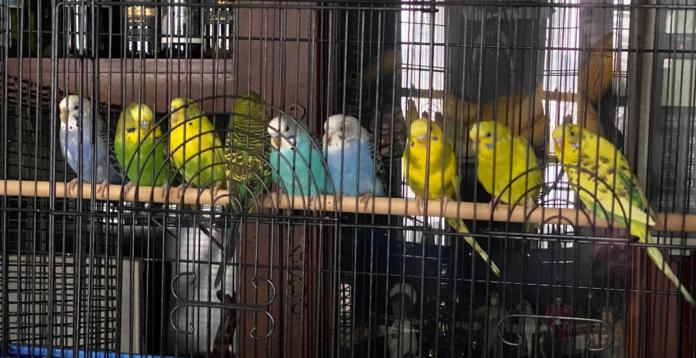By Angelina Hu
On the evening of December 23rd, the Detroit Animal Welfare Group in Michigan found themselves overwhelmed by the sudden arrival of 497 parakeets. They were from the son of an animal hoarder who wanted to try breeding a few birds, which clearly ended in disaster.
The birds had all been raised in a single room in the hoarder’s house. He’d spent $1,200 providing for them each month, and evidently the birth of so many hatchlings was too much to handle. Parakeets often have four to eight eggs per clutch, which hatch in only twenty days. It’s easy to imagine how rapidly the breeding got out of control.
Much to the shelter’s everlasting credit, they accepted all of the parakeets and spent the night very swiftly setting up temporary housing. The parakeets varied greatly in age, from fully matured adults to babies who had yet to even eat on their own. Some were ill, and they had all arrived crammed together into seven small cages, so it was imperative to get them into better conditions.
What’s worse, on December 26th, the hoarder returned with 339 more birds. That made 836 parakeets surrendered in total! In cooperation with some local bird rescue centers, such as Jojo’s Flying Friends and the East Michigan Bird Rescue, the shelter has since gotten all of the birds into safe conditions, and the adults will be up for adoption in early January.
This story, among many others, is a very dramatic demonstration of irresponsible animal ownership and breeding, a trend that has most certainly existed for many years. However, in recent times, the pandemic in particular magnified the problem and put it on alarming headlines everywhere.
The story of irresponsible pet ownership is an age-old one. Someone wants a pet because of temporary circumstances or desires, so they buy or adopt one. However, once the going gets tough and they realize it was too much work, they dump the pet at the animal shelter. This results from the objectification of animals, in which people treat the creature as a toy rather than as a friend and discard it as soon as it’s not “easy”, as well as the lack of long-term commitment and consideration. While this problem, in theory, should be more prevalent in the ownership of exotics, it’s the most obvious in dog and cat ownership due to the high numbers of such common pets in American households.
Throughout 2020, people were forced to quarantine at home due to Covid. This created a surge of stress, anxiety, and depression, which led many people to get themselves a furry companion to ride out the storm. It’s well known that cats and dogs are fine pets that can be intuitive and brighten up their owner’s moods, and as such, shelters were literally emptied. Adoption rates rose 12 percent in 2020 according to PetPoint. These pandemic pets, as they are called, found themselves new homes and hope for a new life. In addition, less pets were taken in by shelters in 2020 than any of the four prior years. From 2016 to 2019, animal intake rates have been steadily above 3,100,000 a year. However, in 2020, only 2,296,367 animals entered the shelter, according to the Best Friends Animal Society.
The opposite has happened in 2021. Pet surrender rates have increased in some parts of the country, especially in mid-2021, when the pandemic was starting to die down and people were going back to work. Many shelters around the country have reported surrender rates rising, with many people citing financial pressure and work schedules as the reason they cannot keep them. For example, back in May to June of 2020, Moms and Mutts Colorado Rescue saw their surrender rates doubling the average amount, and most of the surrendered animals were one year old– pandemic puppies, they’re called. This trend is still ongoing though, and it’s not exclusive to dogs and cats. For example, the week before Christmas, our local Jenn’s Exotic Pet Store saw three rabbits surrendered. Even worse, all three were pregnant females, so they ended up with a number of baby bunnies. Since the prime “breeding age” of a rabbit is actually around two years old, this puts these three as possible pandemic pets.
This entire pandemic up-and-down of animal adoption and surrendering is a display of irresponsible ownership. You get bored and lonely during the pandemic, so you get yourself a pet without considering the long-term logistics of ownership. After the animal has accompanied you through the lowest of lows, you then give it up because you discover you cannot actually care for it. It’s clearly irresponsible, and the pet ends up treated only as an object that is discarded once its usage is up.
The hoarding case is a more isolated and dramatized version of this story. Hoarding is often a symptom of mental illness, but irresponsible attempts at breeding the birds (possibly out of boredom due to quarantine) forced them to surrender. Again, action without any sense of foresight ended with the birds being dumped at the shelter.
The results of commercialized petkeeping and the objectification of animals still plague our society today, and this trend is unlikely to be fixed in the near future, or ever, in all honesty. However, it is possible that with more awareness and education about the irresponsible ownership crisis, more people will recognize the logistics of petkeeping and decide to think twice about impulsively adding a furry friend to the family.

